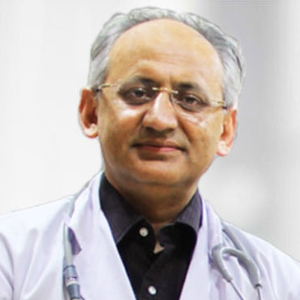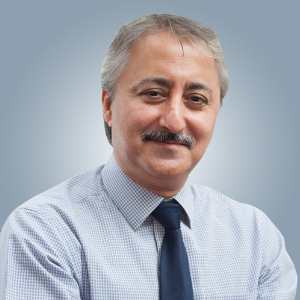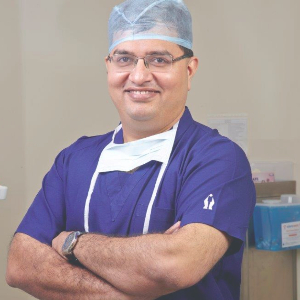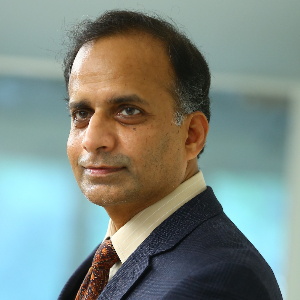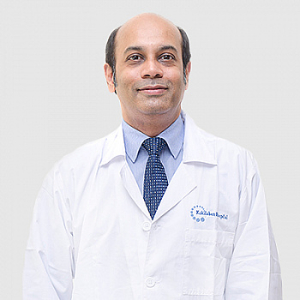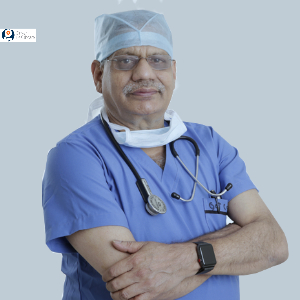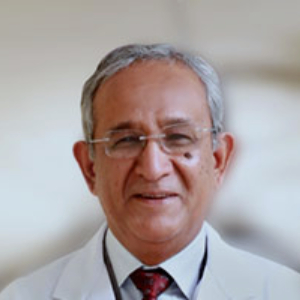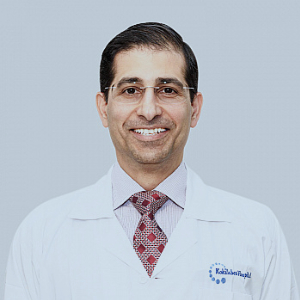Best Doctors in India for Birmingham Hip Resurfacing Surgery
- Orthopedic Surgeon, Gurugram, India
- Over 25 years’ experience
Profile Highlights:
- Dr. Ravi Sauhta is a renowned Orthopedic Surgeon in India with 25+ years of experience in Joint Replacement and Reconstruction surgeries.
- He was the first surgeon in India to use minimally invasive AO techniques for trauma and also introduced reconstructive pelvic acetabular surgery and reconstructive bone tumor surgery in 1995.
- Pediatric Orthopedic Surgeon, Gurugram, India
- Over 24 years’ experience
Profile Highlights:
- Dr. Sanjay Sarup is a leading Orthopedic Surgeon with over 24 years of experience during which he has been associated with the best hospitals in the country.
- He performs a number of orthopedic procedures that includes surgery for correcting Scoliosis and Kyphosis, Club foot, dislocated hips, and hip deformity since birth among several other procedures.
- Dr. Sarup received his training in orthopedic surgery from leading hospitals in India and UK and holds a Fellowship of the Royal Hospital for Sick Children, Glasgow in Pediatric Orthopedics.
- Pediatric Orthopedic Surgeon, Gurugram, India
- Over 20 years’ experience
Profile Highlights:
- Dr. Manoj Padman is a renowned Pediatric Orthopedic surgeon in India specializing in the management and treatment of diseases and disorders of the musculoskeletal system in young children.
- Dr. Manoj Padman is considered one of the best surgeons in India for the correction of deformities and congenital defects in children. His primary interest includes birth anomalies, hip pathologies, post-infective and post-traumatic sequelae, and limb reconstruction surgeries.
- Orthopedic Surgeon & Spine Surgeon, Gurugram, India
- Over 25 years’ experience
Profile Highlights:
- Dr. Vineesh Mathur is an accomplished and renowned Orthopedic Surgeon in India specializing in Spine Surgery.
- He holds an extensive experience of 25+ years in the field of orthopedics and spinal surgery and has performed over 6000 independent surgeries till date.
- Dr. Vineesh Mathur is highly trained in all kinds of spinal procedures and received training in the procedures from distinguished institutes in India, Spain, Turkey, USA, South Korea, and Denmark
- Orthopedic surgeon, Chennai, India
- Over 35 years’ experience
Profile Highlights:
- Dr. A B Govindaraj is a leading Orthopedic surgeon who holds an extensive experience of more than 3 decades in the field and performs over 300 joint replacement surgeries annually.
- He excels in unilateral and bilateral total knee replacement, total hip replacement, and shoulder replacement surgeries.
- Pediatric Orthopedic Surgeon, Mumbai, India
- Over 15 years’ experience
Profile Highlights:
- Dr. Alaric Aroojis is a renowned Pediatric Orthopedic Surgeon in Mumbai and his expertise and primary area of specialization lie in deformity correction, cerebral palsy, and congenital anomalies. He is also an expert in performing complex pelvic osteotomy for congenital hip dislocation in young patients.
- He holds an extensive experience of more than 15 years in Pediatric Orthopedics and is highly skilled at using minimally invasive procedures for difficult limb deformity corrections.
- Orthopedic Surgeon, Hyderabad, India
- Over 30 years’ experience
Profile Highlights:
- Dr. B N Prasad is a well-known Orthopedic Surgeon with over 3 decades of experience.
- Dr. B N Prasad is among the few surgeons in the country to specialize in both adult and pediatric orthopedics and has taken up numerous cases and treated patients with excellent outcomes.
- He provides diagnostic as well as surgical treatment for various types of orthopedic disorders such as arthritis and osteoporosis.
- Orthopedic Surgeon, Gurugram, India
- Over 40 years’ experience
Profile Highlights:
- Dr. B K Singh is one of the best Orthopedic Surgeons in India with experience encompassing over 4 decades.
- He holds the credit for over 5000 Arthroplasty procedures and is one of the few surgeons in India with expertise in Robotic Knee and Hip Replacement Surgeries.
- Dr. B K Singh received his training in Joint Replacement Surgery and Robotic Knee and Hip replacement procedures from India, UK, and Japan.
- Orthopedic Surgeon, Mumbai, India
- Over 22 years’ experience
Profile Highlights:
- Dr. Dinshaw Pardiwala is an Orthopedic Surgeon par excellence specializing in shoulder replacement and sports injuries surgeries.
- With several firsts to his name, he performed the first Reverse Shoulder Replacement surgery, the first Navigation guided ACL Repair and the first Autologous Chondrocyte Stem Cell Transplant in India.
- Dr. Dinshaw Pardiwala introduced the Osteochondral Allograft Transfer and Transplant in India.
- Orthopedic Surgeon & Spine Surgeon, Mumbai, India
- Over 20 years’ experience
Profile Highlights:
- Dr. Gautam Zaveri is one of the best spine surgeons in India today and has performed over 3000 spinal surgeries for the treatment of spinal fractures, trauma, slipped discs, kyphosis, scoliosis, sciatica, spondylolisthesis, and spinal stenosis.
- Dr. Zaveri specializes in Minimally Invasive Spine Surgeries commonly known as MISS and performs most of his procedures using this technique to minimize cuts and speed up the recovery process.
Best Hospitals in India for Birmingham Hip Resurfacing Surgery
Fortis Escorts Hospital, New Delhi
- City: New Delhi, India
Hospital Highlights:
- Over the last 33 years, the Fortis Escorts Heart Institute has set new standards in cardiac treatment with groundbreaking research. It is now known around the world as a centre of expertise for Cardiac Bypass Surgery, Interventional Cardiology, Non-invasive Cardiology, Paediatric Cardiology, and Paediatric Cardiac Surgery.
- The hospital has cutting-edge laboratories that perform a wide range of diagnostic tests in Nuclear Medicine, Radiology, Biochemistry, Haematology, Transfusion Medicine, and Microbiology.
- Fortis Escorts Heart Institute boasts a diverse group of bright and experienced doctors who are backed up by a team of highly qualified, experienced, and devoted support professionals as well as cutting-edge equipment such as the recently installed Dual CT Scan.
- Approximately 200 cardiac doctors and 1600 personnel currently collaborate to manage over 14,500 admissions and 7,200 emergency situations each year. The hospital now has a 310-bed infrastructure, as well as five cath labs and a slew of other world-class amenities.
Rela Hospital, Chennai
- City: Chennai, India
Hospital Highlights:
- RIMC is a multi-specialty hospital in a sprawling area of 36 acres located in Chromepet, Chennai, Tamil Nadu, India.
- The facility has 450 beds including 130 critical care beds, 9 operating rooms, modern reference laboratories and radiology services, and is conveniently located near road, rail and air transportation.
- RIMC is led and managed by world-renowned physicians committed to healthcare.
- RIMC offers the broadest range of clinical care, education, and research. The hospital offers state-of-the-art technology and modern treatment facilities designed to provide health care at an affordable cost.
- Rela Institute is driven by patient needs, comfort and confidence.
CARE Hospitals, Hyderabad
- City: Hyderabad, India
Hospital Highlights:
- CARE Hospitals were established in the year 2000, by CARE Group.
- The multispecialty hospital has 435 beds, including 120 critical care beds, with an annual inflow of 180000 outpatients and 16,000 in-patients.
- The hospital provides specialty medical services in Cardiology, Cardiothoracic Surgery, Pediatric Cardiology, Pediatric Cardiothoracic Surgery, Neurology, Neurosurgery, Nephrology, and Urology.
- The hospital has the first dual source, 128 slice CT scanner (for high precision cardiac imaging) – the first of its kind in south India.
- The hospital offers a wide range of accommodation facilities for the convenience of its varied patient base, ranging from general wards to super deluxe rooms.
Fortis Hiranandani Hospital, Mumbai
- City: Mumbai, India
Hospital Highlights:
- Fortis Hiranandani hospital was established in 2007.
- The hospital is an advanced tertiary care, multi-specialty hospital equipped with 149 beds.
- The hospital is equipped with a super ICU to provide emergency medical care to critically ill patients.
- The hospital is NABH accredited.
- The critical care facility in the hospital is augmented with the state-of-the-art facilities that facilitate speedier diagnosis and efficient monitoring.
- The hospital provides specialty medical services in cardiology, orthopedic science, pediatric science, neurology, diabetic care, urology, nephrology, ENT, obstetrics, gynecology, cosmetic surgery, bariatric surgery, neuro and spine care.
Fortis Hospital, Anandpur, Kolkata
- City: Kolkata, India
Hospital Highlights:
- Fortis Hospital, Anandapur, Kolkata is a world-class super-speciality equipped with the latest technologies in the medical world.
- The hospital is NABH accredited.
- This state-of-the-art facility specializes in cardiology and cardiac surgery, urology, nephrology, neurosciences, orthopaedics, digestive care, emergency care and critical care.
- The hospital, governed by integrated Building Management System (IBMS), has a pneumatic chute system, for quick vertical and horizontal transportation between floors, facilitating speedy transfer of patient specimens, documents, reports, and medicines to the concerned departments.
- The hospital also has a nephrology department with over 28 advanced dialysis units.
Fortis Hospital Banerghatta, Bengaluru
- City: Bengaluru, India
Hospital Highlights:
- Fortis Hospital Bannerghatta, Bengaluru was established in 2006.
- The hospital is a 276 bedded multi-specialty tertiary care facility.
- The hospital specializes in cutting-edge medical technology and dedicated patient care services.
- The hospital is equipped with state-of-the-art technologies like trans-radial angioplasty, trans-abdominal cardiac surgery, and computerized TKR navigation surgery.
- The hospital provides specialty medical services in cardiology, cardiac surgery, orthopedics, neurology, neuro-surgery, GI, and Minimal Access Surgery (MAS).
Fortis Hospital, Malar, Chennai
- City: Chennai, India
Hospital Highlights:
- Fortis Malar was established in 1992 and was formerly known as Malar Hospital.
- The hospital specializes in cutting-edge medical technology and dedicated patient care services.
- The hospital is multi-specialty, tertiary care facility with 180 beds.
- The hospital offers comprehensive medical care in specialties such as cardiology, cardio-thoracic surgery, neurology, neurosurgery, orthopedics, nephrology, gynecology, gastroenterology, urology, pediatrics, and diabetes.
Gleneagles Global Hospital, Parel, Mumbai
- City: Mumbai, India
Hospital Highlights:
- Gleneagles Global Hospital The 450-bed facility comprises of 17-stories, housing state-of-the-art infrastructure, and advanced medical care facilities.
- The hospital offers end-to-end clinical, surgical, and diagnostic services. It is equipped with a team of eminent medical professionals aided by qualified nurses and medical staff
- The Hospital offers advanced Endoscopic procedures, Hepatobiliary and Liver Surgeries, Surgical and Medical Gastroenterology, Bariatric Surgery, and Robotic surgery.
- The hospital is a center of excellence for Orthopedics, Joint Replacement, Knee Replacement, and Hip Replacement surgery.
Jaypee Hospital, Noida
- City: Noida, India
Hospital Highlights:
- Jaypee Hospital is the flagship hospital of the Jaypee Group.
- This hospital has commissioned 525 beds in the first phase and has been planned and designed as a 1200 bedded multi-specialty facility.
- It holds the accreditation of the NABH and NABL.
- The hospital has state-of-the-art infrastructure equipped with the latest technologies and modern equipment like 64 Slice PET CT, Dual Head 6 Slice SPECT CT, Gamma Camera, and Da Vinci Robotic Surgery for comprehensive robotic surgical solutions.
- It has special Centers dedicated to the major specialties to provide hassle-free and high-quality clinical care.
Manipal Hospital, Dwarka, Delhi
- City: New Delhi, India
Hospital Highlights:
- Manipal Hospitals, Dwarka, is a super-specialty hospital in Dwarka, New Delhi, which is a part of Manipal Hospitals Group.
- The hospital aims to provide the best treatment on par with international standards at a fraction of the cost.
- Equipped with 380 beds, the hospital is also one of the new age hospitals which are equipped fully with state-of-the-art infrastructure, cutting-edge technology as well as the latest and advanced clinical practices. The hospital also has 13 modular Operation theatres with 118 beds which are solely meant for critical care.
- The hospital comprises internationally acclaimed doctors and highly professional and experienced hospital and medical staff who are able to provide preventive, therapeutic, and diagnostic services all under one roof.
Birmingham Hip Resurfacing
The Birmingham Hip Resurfacing Surgery is a surgical procedure first introduced in the United Kingdom by manufacturer Smith & Nephew in 1997 and is currently implemented in over 26 countries as a medical alternative to Total Hip Replacement. The surgical procedure is recommended for patients who suffer from bad or worn out hip problems as the procedure aims to relieve intense hip pain and stiffness by ‘resurfacing’ a portion of the damaged hip bone.
What is Hip Resurfacing and how is it Different from Hip Replacement?
The Birmingham Hip Resurfacing surgery (BHR) is an alternative medical option to Total Hip Replacement (THR) where doctors place a mushroom-top cap over the head of the femur bone and another matching metal mushroom cap on the pelvis socket. Before the metal caps are inserted, a small part of the damaged bone is shaved or ‘resurfaced’. On movement of the hip bone, the joints produce a synovial fluid that acts as lubrication between the two metal surfaces and this pain from bone friction or stiffness is eliminated.
This procedure differs from the traditional hip replacement method where the entire hip joint is replaced completely leading to maximum bone loss, a situation that might not be favorable for younger patients. However, the hip resurfacing surgery needs to be done under an experienced medical team since it involves careful alignment of the metal caps in order to avoid future complications after the surgery.
When does a doctor recommend BHR?
Hip damage can be caused by different arthritis types such as osteoarthritis or rheumatoid arthritis, trauma etc. Conditions like bone tumour, avascular necrosis or dysplasia too can cause hip bone damage. Conditions like these affecting young patients can cause permanent hip bone damage but medical treatments like a total hip replacement surgery can prevent any possible future surgery options in young patients. Doctors hence recommends hip resurfacing surgery which preserves future surgical treatment options.
Birmingham Hip Resurfacing benefits
- The hip resurfacing surgery allows maximum bone conservation and is considered an apt medical treatment, especially for younger male patients ( less than 50-60 years old).
- The BHR success rate worldwide has been 90.2% to 98.6% making this medical procedure one of the most recommended treatment technique.
- Effect of the hip resurfacing surgery is known to last much longer than hip replacement method which makes it apt for long-term results.
- This medical procedure has the fastest recovery rate with documents revealing how some patients could go back to normal leg functioning within just 4 hours of the surgery. The usual time for complete recovery is 2-3 weeks within which the patient can go back to their normal life.
- This medical procedure also reduces hip dislocation complications significantly.
Common Diagnostic Tests Before Hip Resurfacing Surgery
Before recommending the surgery, your doctor or medical team might run a few clinical exams to diagnose the exact cause of the underlying condition and to determine whether hip resurfacing surgery is the best medical option for your condition or not. Usual tests may include physical tests or movement tests to determine the exact location or intensity of the pain. Doctors may ask about your medical history or possible bone or hip complication of the past and may ask for MRI or ECG results to determine whether the condition is merely related to the bones or does it have neurological complications involved. Doctors may also prescribe other necessary clinical exams if needed to understand the condition better.
Birmingham Hip Resurfacing Surgery Process
Preparation
There are no exclusive preparations needed for this procedure. Patients should inform the medical team of any past or present medical condition including intake of any daily medicine like antibiotics, blood thinners, pain killers, herbal or vitamin supplements, homeopathy doses, etc. You can ask your doctor for a detailed dietary chart to follow before the surgery. Doctors usually recommend no eating or consuming alcohol 12 to 10 hours before the surgery.
Procedure
The detailed procedure for this surgery may vary from patient to patient based on their surgical condition. Generally, an orthopaedic surgeon conducts the surgery with the help of a medical team and the entire procedure takes about 2-3 hours in total. This is a two-part surgery.
Step 1
Step 1 starts with the patient undergoing local or full anaesthesia to avoid any pain or discomfort during the procedure. The surgeon will then make a small incision in the patient’s thigh, preferably in the back to reveal the femoral bone once it’s been taken out of the hip joint socket. The top of the femoral bone is then trimmed or shaved with the help of surgical instruments and the doctor fits a metal cap over the head. This concludes the first part.
Step 2
Step 2 of the procedure starts with shaving or trimming the damaged bone or cartilage lining the pelvic socket before another metal cap is fitted into the socket. The surgeon now places the femoral bone back into the socket and aligns the metal-to-metal implant. The procedure ends with the surgeon closing the incision.
The Hip Resurfacing Surgery is Not Appropriate on these conditions:
- If the patient is pregnant
- If the patient’s bone health is weak or filled with multiple cavities
- If the patient has a kidney disorder
- If the patient is sensitive to metal
- If the patient is overweight or obese
- If the patient has chronic blood or bone infection
- If the patient has an immunity disorder due to diseases such as AIDS.
Risk Factors of Birmingham Hip Resurfacing Surgery
- Blood Clot
- Bone infection
- Bleeding Disorder
- Injured Nerves in and around the operation area
- Femoral fracture
Birmingham Hip Resurfacing Surgery Precaution & Care
Pain or soreness in the muscle or hip joint is normal after the surgery. The pain or soreness might be prominent near the incision area including chances of fluid leaking in and around the incision. While doctors prescribe pain medications for the soreness, fluids yellow or white in colour should be reported to the doctor immediately, especially, if the fluid draining is accompanied by redness or swelling. However, minimum fluid leakage is actually normal for this treatment.
There are no special diet regulations but it’s always better to check in with the medical team regarding diet to avoid interaction with medications prescribed. Based on your recovery rate, the medical team may ask for imaging scans or will advise you for physical therapy. A cane or a crutch for the initial recovery days might also be prescribed. Doctors will also determine when the patient can start applying pressure or go back to their normal lifestyle.
FAQs
How long do I have to stay in the hospital after a hip resurfacing surgery?
About 4-5 days hospital stay is needed.
How fast can I recover from the hip resurfacing surgery?
Usually, patients can start walking after 4 hours of the surgery, but that is completely based on the patient’s recovery rate. Doctors usually keep 2-4 weeks as the general recovery period.
Do I have to undergo hip resurfacing a second time?
Taking wear and tear into account, patients after 10-20 years might have to reappear for a resurfacing or total replacement surgery based on their condition.
Is this surgical procedure safe?
This surgery was approved by FDA in 2016 and so far 3000+ hip resurfacing surgeries with successful results have been performed.
Can I run after my hip resurfacing surgery?
Clinical documentations say running is possible after this surgery. However, long-term effects such as wear and tear are not calculated in this documentation. Your doctor will be able to guide you better on this.

